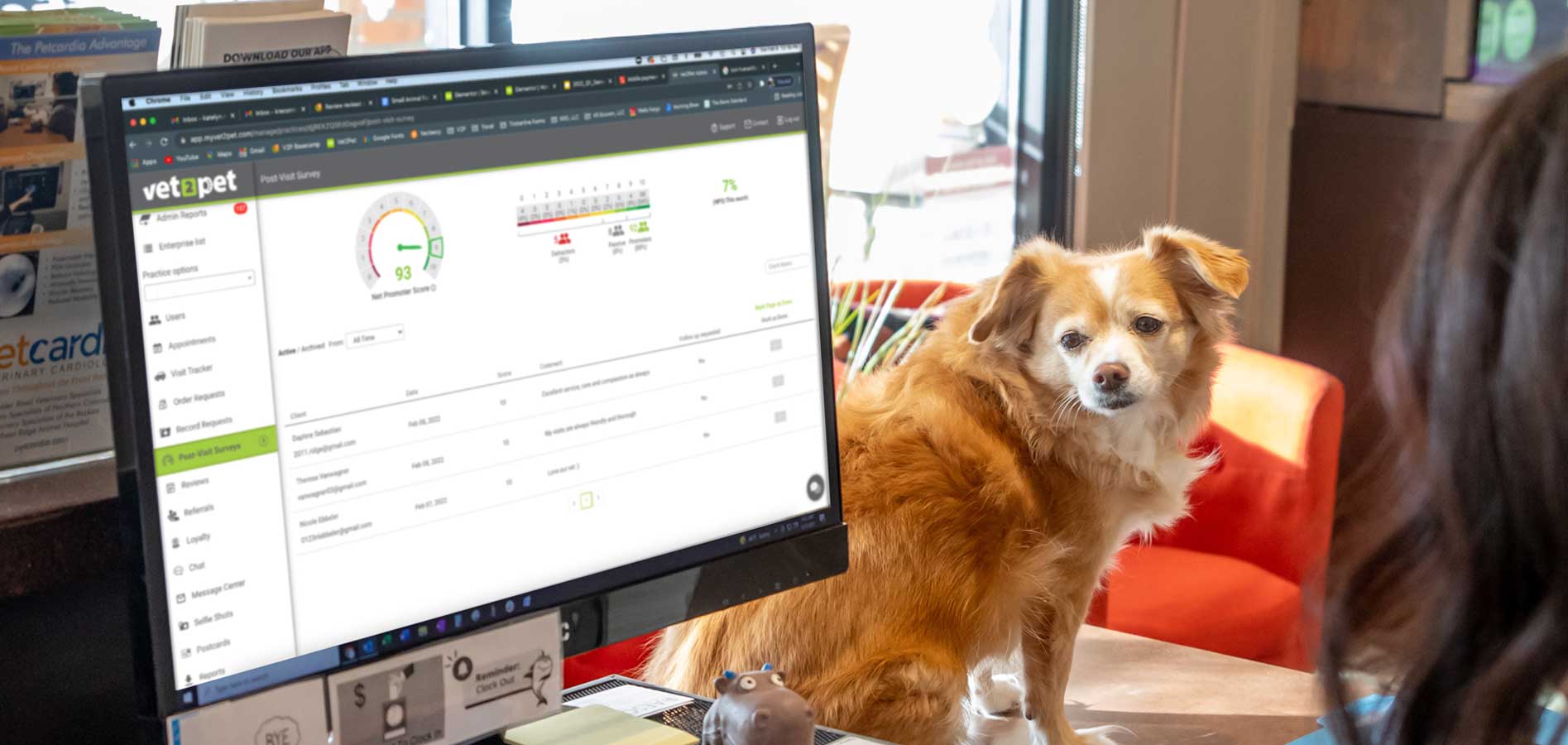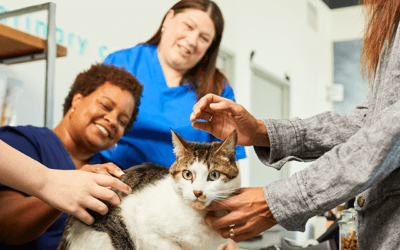Asking for feedback isn’t something that comes naturally to many of us. In fact, it can be downright terrifying. But, if you’re able to overcome that fear and ask for feedback, you can learn some invaluable lessons.
The same is true when it comes to your veterinary practice. Regularly surveying your clients can illuminate your practice’s strengths and weaknesses so you can constantly strive to provide the best experiences.
1: Bolster your team’s confidence by regularly sharing positive feedback
It’s not enough to just rack up those 5 stars online. When vet practices share the 5-star reviews with the entire team, veterinarians, technicians, and receptionists can all get that all-too-infrequent, but oh-so-rewarding glimpse of gratitude and reaffirmation of the hard work they’re doing. Here are a few ways to make sure the whole team knows what’s working, how they’re helping, and which patients and clients are sending the love:
- Share all positive reviews into your team’s private Facebook group or Slack channel.
- Print all the good reviews and display them in the breakroom.
- Share the top reviews and overall ratings at your next staff meeting.

2: Improve your net promoter score (NPS) to increase your practice’s valuation
Developed in 2003, the net promoter score (NPS) is considered by many to be the gold standard of evaluating customer loyalty and satisfaction across a multitude of industries.
It asks, simply in most cases, “How likely are you to recommend our business to your friend or colleague?” on a 1–10 scale.
- Promoters: Answer 9–10. These are your most loyal clients, and the vocal ambassadors of your practice. These are true marketing assets for your business and should be treated as such.
- Passives: Answer 7–8. These clients are undecided and don’t want to commit one way or the other. They’re probably doodle owners.*
- Detractors: Answer 0–6. These clients are a detriment to the practice. They can become negative, and may give comments or reviews that influence others.
The NPS is important — and directly linked — to the value of many businesses, particularly because it is measuring the loyalty of its client base. It gives insight into the relationship the practice has with its veterinary clients, the customer experience it delivers, and the likelihood that future business based on a positive reputation will continue, and potentially grow.

3: Identify upset clients before they go online with their grievances
When vet practices send surveys to clients after their visit, they offer an avenue for clients who may have had a less-than-stellar experience to voice their frustrations (real or perceived). Giving them this “out” allows for discrete feedback that the practice can choose to address, and, in many cases, prevents them from turning to a public online review forum like Google, Nextdoor, Facebook, Yelp, and others. Survey feedback and results are accessible only to the practice team—rather than the entire world, as in online review sites—and can be acted upon without the limitations of a third-party review platform and under scrutiny from others.

4: Learn from your mistakes and make improvements
While online reviews often get a bad rap in our industry, they can have a silver lining. Too often, practices rush to the defensive and assume every negative review is from a crazy Karen whose feedback is wrong and worth nothing to the practice. While it’s true those reviews do happen (we’ve all experienced them!), sometimes, we really did deserve that review. Maybe we did make a mistake, or we could have done better to serve that pet or their family.
I got a bad review during the early days of the pandemic because I completely forgot that there was a patient waiting to be seen in the parking lot. Since there wasn’t a person in our lobby awkwardly staring at our front desk team, and our check-in system had yet to be perfected, we simply forgot. The owner waited, with their pet, in their car in the heat, for nearly three hours before calling again! It was my mistake, and I deserved the 3-star review the owner left. But on the plus side, we all immediately realized our system needed improvement, we devised a new process, and it never happened again.
Of course, there could be much more serious mistakes, and much more harmful reviews — I’m not discounting those or the stress they bring. But with every review comes an opportunity to understand more about our clients — what they experience, what they prefer, and a possibility for us to meet them in the middle.

5: Get more positive online reviews
Reviews are now an essential part of how a veterinary practice — and any business — earns new clients, attracts new employees, and maintains its reputation. In today’s digital world, a positive star rating can be a prospective client’s deciding factor to book an appointment at your practice instead of your competition’s, or better yet, be an attractive element to a potential new hire.
In addition, online reviews can help build trust and relationships with existing clientele, provide valuable customer insight, and help strengthen your practice’s brand identity. Posted reviews help serve as “social proof” for prospective clientele, help improve your search engine ranking, and can be used as shareable social media content.
As the cheesy saying goes, “knowledge is power.” The knowledge of how our clients view our practice and the service, care, and experience we provide is integral to the success of our business. Without it, we cannot continue to evolve and grow, and risk becoming stagnant or forced to continue in an environment where our practice hopes and dreams don’t align with those of our clientele.
When veterinary practice teams shift their feedback mindsets from a reactive to a proactive approach, we have a better opportunity to correct problems when they occur, strengthen bonds with our clients, improve the value and reputation of our business, and give our team the kudos they deserve.
Find out how you can easily survey your clients using the Vet2Pet all-in-one client engagement system.
*Just kidding! Kind of.



